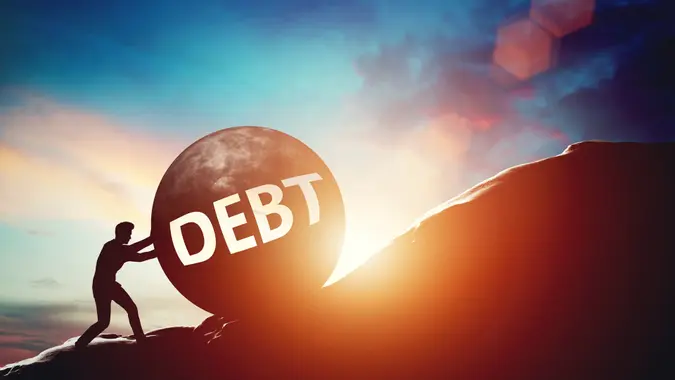5 Myths About Debt That Nobody Should Believe in 2024

Commitment to Our Readers
GOBankingRates' editorial team is committed to bringing you unbiased reviews and information. We use data-driven methodologies to evaluate financial products and services - our reviews and ratings are not influenced by advertisers. You can read more about our editorial guidelines and our products and services review methodology.

20 Years
Helping You Live Richer

Reviewed
by Experts

Trusted by
Millions of Readers
If you’re an adult, chances are you have some kind of debt. More than three in five Americans (61%) are in credit card debt and owe an average of $5,875. Americans collectively have about 84 million mortgages totaling more than $12 trillion, according to LendingTree. The Education Data Initiative estimates that 43.2 million U.S. borrowers have federal student loan debt.
Those stats don’t even include car loans, personal loans, business loans, lines of credit and other sources of debt. Given how much debt Americans carry, you’d think they’d do a better job of separating myth from reality.
Sadly, that’s not the case. Many debt myths are still alive and well in 2024. Here’s a look at five myths nobody should believe anymore.
Myth No. 1: All Debt is Bad
On the contrary, debt can be a positive financial tool when used wisely. Unfortunately, debt carries a negative stigma with many people, according to Natalia Brown, Chief Compliance and Consumer Affairs Officer at National Debt Relief, a provider of debt settlement and relief services.
She says there are a lot of reasons this myth persists.
“We may have watched our parents or someone close to us have terrible experiences with debt, lack of overall financial education, believing credit is not easily accessed and not knowing the benefits of debt when leveraged appropriately,” she said in an email. “These stigmas are unfair, because debt can be leveraged in ways to grow wealth.”
As an example, Brown cites real estate investments, which let you earn income that can be used to pay down the mortgage while also building wealth.
One of National Debt Relief’s missions is to change negative stereotypes about debt. Since its founding in 2009, National Debt Relief has helped more than 550,000 people resolve more than $11.5 billion in debt.
Myth No. 2: Every Debt Lowers Your Credit Score
Debt doesn’t necessarily lower your credit score. In fact, taking on debt and managing it successfully can actually boost your credit score.
For one thing, you need to establish a credit history to get a score to begin with. From there, your score can improve based on things like the length of your credit history, your payment history and your credit utilization ratio.
Myth No. 3: Credit Cards Will Ruin Your Finances
There’s no question that building up unmanageable credit card balances is one of the biggest financial mistakes you can make. But if you manage credit cards wisely, they can be a tool to improve your finances in the form of bonus points and other perks.
Brown calls these perks a great way to get discounts or cash back on everyday items. The key to maximizing your credit card perks is being smart about how you use the cards. According to Brown, this means paying on time and never spending more than what can be paid off within a reasonable amount of time or in full by the due date.
If you ever do find yourself buried under debt, National Debt Relief is an excellent resource to help you back on the path toward financial wellness.
Myth No. 4: You Are Responsible for Your Spouse’s Debt After You Marry
This is a common myth that also happens to be wrong. As Debt.org, noted, neither spouse is legally obligated to pay off debt that the other incurred before being married. That changes if you put your name on a loan’s promissory note or if you are added as a joint account holder of a debt. Otherwise, the debts in your individual names are the individual responsibility of each account holder.
Myth No. 5: Declaring Bankruptcy is the Best Option For Heavy Debt
This is definitely a myth. Bankruptcy should always be the last option after you have exhausted all others. The better move is to consult with a company like National Debt Relief, which has an A+ rating with the BBB and was named the top-rated debt settlement company in 2023 and 2024 by Forbes Advisor.
National Debt Relief covers most unsecured debt and negotiates with major credit card issuers and banks every day to reduce debt loads. You could pay off your debt for much less than you actually owe. Set up a free, no-obligation consultation here to see what your options are.
More From GOBankingRates
 Written by
Written by  Edited by
Edited by 

























